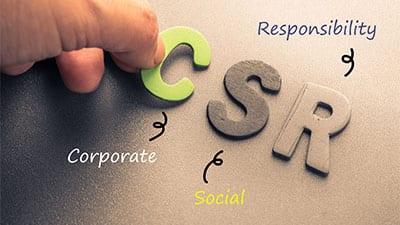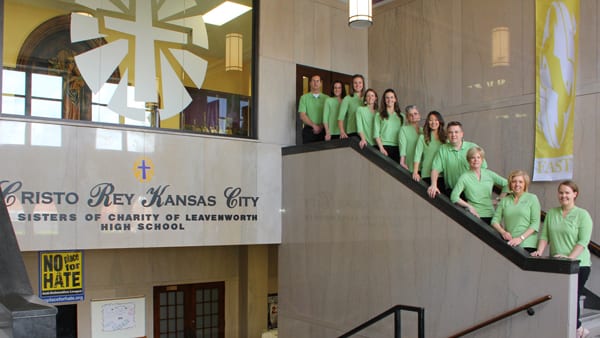 As 2017 comes to a close and we embark on a new year, it is an opportune time to think of how you can continue to build and strengthen your brand. At Dobies Health Marketing, we are fortunate to work with leaders across the healthcare spectrum, frequently advising on brand strategy. We often recommend our clients consider corporate social engagement as a key strategy for building brands, fostering loyalty and enhancing recruitment. Unlike corporate social responsibility, which typically is viewed as a corporate-driven, top-down obligation, corporate social engagement is a thoughtful, mission-driven approach that unites a company and its employees to make a greater social impact and ultimately build better brands.
As 2017 comes to a close and we embark on a new year, it is an opportune time to think of how you can continue to build and strengthen your brand. At Dobies Health Marketing, we are fortunate to work with leaders across the healthcare spectrum, frequently advising on brand strategy. We often recommend our clients consider corporate social engagement as a key strategy for building brands, fostering loyalty and enhancing recruitment. Unlike corporate social responsibility, which typically is viewed as a corporate-driven, top-down obligation, corporate social engagement is a thoughtful, mission-driven approach that unites a company and its employees to make a greater social impact and ultimately build better brands.
Inspiring Employee Engagement
While organizations have long participated in supporting charitable organizations and social movements, efforts to inspire, excite and engage employees historically have fallen flat. Examples of organizations writing hefty checks to support causes abound, while examples of willing and eager participation by employees are far less prevalent.
Driven largely by Millennials (those born between 1980 and the early 2000s), corporate social engagement is rapidly becoming a key tenet of companies’ brand platforms. Millennials, who will comprise as much as 75% of the workforce by 2025, report having the lowest levels of engagement in – and subsequently low loyalty to – their workplaces than any other generation. Beyond a paycheck, Millennials seek jobs that feel worthwhile and contribute to a purposeful life.
While both corporate social responsibility and corporate social engagement serve to benefit society – and ultimately, the organization – there are distinct differences:
| Corporate Social Responsibility |
Corporate Social Engagement |
| First seeks to benefit the corporation, partners and shareholders |
First seeks to inspire employees |
| Top-Down/Prescriptive |
Participative |
| Give back, often in the form of a charitable contribution from the organization |
Give back through employee engagement |
| Ultimately promotes an organization’s product or service |
Ultimately promotes causes associated with the organization’s mission |
| Drives employees to participate in activities |
Inspires employees to become brand ambassadors |
Leaders who recognize the importance of engaging and inspiring employees through their organization’s mission not only are building better brands, cultivating loyalty and strengthening recruitment, they are working toward a greater good that will pay dividends in ways tangible and intangible.
According to Fortune magazine, leading employers are actively engaging their employees in charitable efforts, resulting in a more inspired and productive workforce. According to a survey of 357,000 people for the 50 Best Workplaces for Giving Back, those reporting a positive experience of giving back at work were four times more likely to state that their teams were willing to work harder and give extra to get the job done. They also were more likely to be brand ambassadors for their companies – to express pride in their employers and missions – and say they want to stay with their companies.
At Dobies Health Marketing, social purpose is an integral part of who we are as a company. We engage in creating healthier communities and support the effectiveness of a cause-driven culture. We leverage our resources, talent and time to improve our local communities through a Give-Join-Care approach:
GIVE: Each year, we donate 1% of our net revenue back to our local community, giving funds to causes that promote better health.
JOIN: Through our Apple a Day program, we are inspiring healthy choices and addressing childhood obesity in our local community by sponsoring schools to educate and bring apples to kids. We encourage other organizations to join the movement and impact childhood obesity – one apple at a time.
CARE: Individually, we each volunteer a minimum of one hour per month for causes and events that create healthy KC communities. In 2017 we have proudly contributed more than 200 community service hours collectively in schools, churches, hospitals and boards as our way of creating healthier communities where we live, work and play.
Other examples of organizations that are active in corporate social engagement in their communities include:
- CHG Healthcare Services – Dedicated to helping doctors serve rural areas through a locum tenens staffing model, CHG Healthcare improves the lives of 25 million patients annually. Based in Salt Lake City, CHG Healthcare has more than 2,200 employees (51% Millennials) worldwide.
- “Since day one I have been shown on a daily and weekly basis that CHG cares about its employees, their families, and the community as a whole. Departments are always doing service projects and charity work. Yet we’re still a highly profitable business, which proves you can be kind AND successful.”
- Novo Nordisk – One of the world’s leading diabetes care companies, Novo Nordisk discovers and develops innovative medicines and makes them accessible to patients throughout the world. With nearly 43,000 employees worldwide (17% of U.S. employees are Millennials), the organization reported $19 million in philanthropic donations in 2016.
- “I’ve never worked for a company that gives so much back to the community and allows its employees to take part in charitable activities during work hours. I’ve always been really impressed by this.”
- Etsy – Located in Brooklyn, New York, Etsy is a global commerce platform for creative entrepreneurs. With more than 800 employees (76% Millennials), Etsy became a certified B Corp* to foster community, shared success, commitment to sustainable operations, and use the power of business for a higher purpose.
- “There are so many things that make this a great place to work, but I think the main one is the impact. It’s the impact we’re making on our community, the impact we’re making on the environment, and the impact we’re making in corporate America as we explore what it can mean to be a public company.”
Regardless of company type or size, a common thread in corporate social engagement is the enhanced sense of purpose employees gain from contributing to a greater good that is aligned with corporate mission.
Looking Forward
As you prepare for the challenges and rewards in the coming year, consider enhancing your corporate social engagement strategy to more fully inspire and connect your organization, your employees and your community. Options to expand health-related, mission-driven activities are vast – including sponsoring community exercise activities, providing educational programs on a variety of topics, contributing to improved shared public spaces, or offering healthy cooking classes – and will provide returns to all involved.
To the many organizations who make corporate social engagement a priority, thank you. All of us at Dobies Health Marketing wish you, your communities and all those you serve a happy and healthy New Year.
*B Corps are for-profit companies certified by the nonprofit B Lap to meet rigorous standards of social and environmental performance, accountability and transparency.
About the Authors

 Julie Amor, President and Chief Strategy Officer for Dobies Health Marketing, brings more than 20 years’ experience elevating healthcare brands. Julie co-authored this article with Carol Dobies, our CEO and Founder, who has been bringing healthcare brands to life for more than 25 years.
Julie Amor, President and Chief Strategy Officer for Dobies Health Marketing, brings more than 20 years’ experience elevating healthcare brands. Julie co-authored this article with Carol Dobies, our CEO and Founder, who has been bringing healthcare brands to life for more than 25 years.
Share your thoughts about this article by tweeting @DobiesGroup or commenting on our Facebook page.









 There is a growing body of evidence around the benefits of corporate social responsibility (and its more modern, team-inclusive counterpart,
There is a growing body of evidence around the benefits of corporate social responsibility (and its more modern, team-inclusive counterpart, 
 As 2017 comes to a close and we embark on a new year, it is an opportune time to think of how you can continue to build and strengthen your brand. At Dobies Health Marketing, we are fortunate to work with leaders across the healthcare spectrum, frequently advising on brand strategy. We often recommend our clients consider
As 2017 comes to a close and we embark on a new year, it is an opportune time to think of how you can continue to build and strengthen your brand. At Dobies Health Marketing, we are fortunate to work with leaders across the healthcare spectrum, frequently advising on brand strategy. We often recommend our clients consider  Julie Amor, President and Chief Strategy Officer for Dobies Health Marketing, brings more than 20 years’ experience elevating healthcare brands. Julie co-authored this article with Carol Dobies, our CEO and Founder, who has been bringing healthcare brands to life for more than 25 years.
Julie Amor, President and Chief Strategy Officer for Dobies Health Marketing, brings more than 20 years’ experience elevating healthcare brands. Julie co-authored this article with Carol Dobies, our CEO and Founder, who has been bringing healthcare brands to life for more than 25 years. 

 What do toothpaste, beer, shoes and hospitals have in common? A mission to do good. If you have been watching television or online ads lately, you may have noticed an upward trend of companies infusing corporate social responsibility into their brands. Corporate social responsibility refers to a business practice that involves participating in initiatives that benefit society. However, it is often viewed as a corporate-driven, top-down, obligatory duty that does not connect employees with the mission of the company.
What do toothpaste, beer, shoes and hospitals have in common? A mission to do good. If you have been watching television or online ads lately, you may have noticed an upward trend of companies infusing corporate social responsibility into their brands. Corporate social responsibility refers to a business practice that involves participating in initiatives that benefit society. However, it is often viewed as a corporate-driven, top-down, obligatory duty that does not connect employees with the mission of the company.
